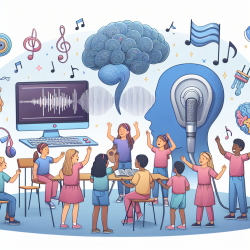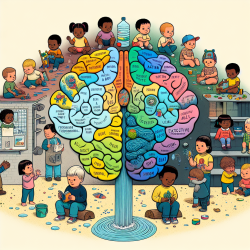Introduction
In the realm of speech-language pathology and child development, innovative and culturally relevant interventions are crucial for addressing the diverse needs of children, especially those from low-income backgrounds. One such intervention, group drumming, has shown promising results in enhancing social-emotional behavior among low-income children, as evidenced by a study published in the journal Evidence-based Complementary and Alternative Medicine.
The Study: Group Drumming and Its Impact
The study, titled The Impact of Group Drumming on Social-Emotional Behavior in Low-Income Children, explored the effects of a 12-week school counselor-led drumming program on fifth-grade students. The intervention combined rhythmic activities with group counseling to build skills such as emotion management, focus, and listening. The results were significant, with improvements noted in various domains of social-emotional behavior.
Key Findings
- Broad-Band Scales: Significant improvements were observed in total problems and internalizing problems.
- Narrow-Band Syndrome Scales: Enhancements were noted in withdrawn/depression and attention problems.
- DSM-Oriented Scales: Anxiety problems and attention deficit/hyperactivity problems showed marked improvement.
- Other Scales: Reductions in post-traumatic stress problems and sluggish cognitive tempo were reported.
Implications for Practitioners
For practitioners working with children in low-income settings, integrating group drumming into therapy sessions can be a powerful tool. The non-verbal and universal nature of drumming makes it an accessible and culturally relevant intervention that can be seamlessly incorporated into existing programs.
Moreover, the study highlights the importance of a holistic approach to child development, focusing on building core assets rather than merely addressing deficits. By fostering a sense of community and shared purpose, group drumming can enhance self-efficacy and positive outcome expectations among children.
Encouraging Further Research
While the study provides compelling evidence of the benefits of group drumming, further research is needed to explore its long-term effects and potential applications in different cultural contexts. Practitioners are encouraged to conduct their own research and share findings to build a robust evidence base for this intervention.
Conclusion
Group drumming, when integrated with group counseling activities, offers a sustainable and effective intervention for improving social-emotional behavior in low-income children. By leveraging the power of the arts, practitioners can create positive developmental outcomes and enhance student-counselor interactions.
To read the original research paper, please follow this link: The Impact of Group Drumming on Social-Emotional Behavior in Low-Income Children.










